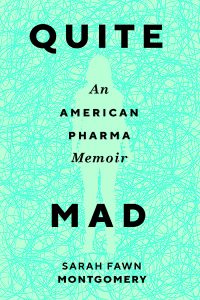Mental Health Narrative(s): A Review of
Quite Mad: An American Pharma Memoir
Quite Mad: An American Pharma Memoir
Sarah Fawn Montgomery
296 pages
Mad Creek Books, $23.95
September 21, 2018

When I started reading Quite Mad by Sarah Fawn Montgomery, my collar suddenly felt tighter, my chest tightening as her chest tightens. “I can’t do this. Her anxiety is making my anxiety act up,” I wrote my editor. But unlike many things that give me anxiety, I didn’t abandon ship. Taking my hand and leading me past the anxiety, Montgomery’s beautiful, lyrical writing kept pulling me in. And therein lies the magic of Quite Mad. The narrative, often uncomfortable, draws the reader in through Montgomery’s beautifully crafted writing. This memoir is a mostly linear, very personal story of the struggle to accept one’s mental illness, intermixed with data and research on the current state of psychiatry, the medical establishment, pharmacology and patient treatment
This is a story of narratives. Montgomery’s own narrative is comprised of parents who take in more and more children, her diagnosis, her attempts to keep it all together through graduate school and as a professor, her trials with medication and their side effects, and her struggles with her husband. Moreover, the memoir explores the current societal narrative of the mentally ill population as people who must be medicated in order to be “normal” with a specific focus on the current and historical intersections of women and mental health. A narrative of wandering wombs, witches, the dangers of sexuality, and hysteria; of madness used as a label to silence women because “it is easier to blame their sanity than their circumstance.”
While deftly written, Montgomery’s inability to see the truth of what was happening, at the time it was happening and the need to blame herself, can be painful. In the same way that we want to shout at characters to avoid the haunted house, I want to call out to Montgomery. Every time she ignores her symptoms, side effects and gut instinct and instead chooses to believe her doctor, her husband, her parents, her friends, I want to go back in time and tell her to believe herself. In the memoir, she writes “My doubt . . . is a sign that my anxiety is worsening. Clearly, I need this new medication. I believe them . . . I continue to take Celexa each night, my hair coming out in handfuls.” As the reader, I want to be her friend. Her advocate.
Like the academic she is, Montgomery does not present information she does not have. Unlike many other autobiographical stories, she doesnot fill in or estimate in places where she does not fully remember events. Stories are presented raw, as remembered—with blunt apologies for missing pieces—because her “anxiety has altered recollection to an Impressionist painting where images defy conventional lines.” Interestingly enough, this Impressionist take on memory makes it easier to visualize and feel her stories because it can be linked to the same way many of us recall our memories: a jumble of pieces, out of sync with time and mixed with stories we’ve heard and the dreams we’ve had. The missing pieces create a sense of realness and while verbatim conversations may be lacking, her research is not. The book is filled with research and data, cleverly connected to the stories being told in each section. When she is first prescribed Xanax, not only does she describe the personal effects but also presents details on the history of the prescription, the number of prescriptions written, as well as the gendered narrative of the prescription for “crazy women (who) ignore womanly hygiene, wifely duties, motherly roles, and domestic space.” Personal experience flows easily into researched data, thereby creating a complete narrative.
Patients deserve to tell their own narratives from their own points of view as they make sense of their pain and symptoms as opposed to upholding the commonplace narrative “edited by doctors,” imposed by society, and dictated by pharmaceutical companies, which serves as Montgomery’s mission in her memoir. We see her rage over medications that don’t work, doctors who don’t listen, and parents who ignore, against a cultural backdrop of women who are dismissed; we also see the joy of finding a therapist who listens. Quite Mad describes a medical and psychiatric establishment that doesn’t work, and hasn’t worked, for the patients it seeks to serve vis-à-vis Montgomery’s personal experience struggling to navigate this world.
Cheryl Fitzgerald has recently graduated with her Master’s in Public Health, and is looking for a career that will let her use her writing abilities. She is considering PhD programs, and is interested in the ways societal aspects such as history, politics, and education impact health.



